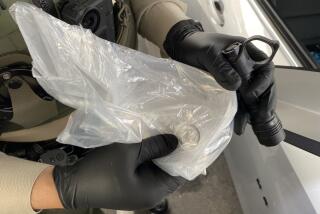GPS Law Stirs Civil Rights Concerns
California probation officials have gained broad authority to latch global positioning system devices onto their charges under a new law that critics call unprecedented for government surveillance.
But for now, cost, not civil rights concerns, will probably limit the use of GPS bracelets or anklets.
The bill, one of the public safety measures signed into law earlier this month by Gov. Arnold Schwarzenegger, will add county probation chiefs to the list of officials who can strap GPS tracking devices to offenders’ ankles without court orders.
The bill’s purpose is to ease legal concerns that might have otherwise barred use of the monitors on probationers, said a spokeswoman for state Sen. Jackie Speier (D-Hillsborough), sponsor of the bill.
The change will bring about greater use of tracking devices -- not just for high-risk, repeat sexual felons who are paroled, but also for people convicted of lesser crimes and given probation.
Some supporters say it could also open the door to broader uses of the devices in the future. Schwarzenegger, for example, has proposed that registered felony sex offenders be forced to wear the bracelets for the rest of their lives.
“In an ideal world, we would have one on every offender,” said Jeff Fagot, regional parole administrator for the state Department of Corrections, who is overseeing a pilot program for the devices in San Diego.
Such talk disturbs civil libertarians, who believe the devices threaten privacy. Ignacio Hernandez, legislative advocate for California Attorneys for Criminal Justice, said the new law is too broad and gives probation officials spying powers well beyond what they need to do their jobs.
“There are no checks or balances for this, and no way to know what it is going to be used for,” he said.
Hernandez says his group does not object to use of the devices for violent repeat sexual offenders on parole. But he finds them inappropriate for probationers convicted of lesser crimes. The latter should be able to go to the doctor or visit their mothers without their probation officers’ knowledge, he said. Representatives of the American Civil Liberties Union also opposed the law, saying it was too vague. GPS monitoring devices are more advanced than electronic bracelets, which enforce home confinement of offenders from a base station attached to a phone line. Electronic bracelets can tell authorities only that offenders aren’t home, not where they’ve gone. GPS shows offenders’ locations on a map, 24 hours a day, in real time.
Proponents say GPS is a powerful tool for deterring crime and tracking the exact location of an offender at any time. The information also can be shared with other law enforcement agencies to possibly identify or clear suspects in a crime.
California’s version of the GPS device -- a black anklet equipped with an antenna -- is solely for parolees. It is manufactured by a privately held Houston company called Satellite Tracking of People, one of several competitors in the fast-expanding national market.
The anklet allows a parole agent to call up data on a computer screen showing offenders’ whereabouts. “It’s kind of like ‘follow the bouncing dot,’ ” said Brenda Crowding-Johnson, a San Diego-area parole agent.
Monitoring an offender this way nearly doubles the price of parole. In addition to the $3,300 average cost of traditional parole, the device costs about $3,100 a year per parolee.
Criminal justice funds are already stretched in many jurisdictions, and officials such as Paul Higa, chief probation officer for Los Angeles County, say they do not have money budgeted for GPS monitoring.
But officials elsewhere are eager to begin using the devices. The Orange County Probation Department, which pushed hard for the new law, has set aside $75,000 for a pilot program, said Vicki Mathews, the department’s legislative analyst.
Before the law’s passage, many probation officials were unsure of their authority to use GPS monitoring technology on their offenders.
San Diego County corrections officials started using the systems on 82 high-risk sexual offenders as part of a $5.4-million pilot program this summer that will eventually be implemented throughout the state.
Some parolees from Los Angeles County are expected to be included in the program within a year, said Fagot, the parole official.
Those who are being tracked generally fit the profile most often invoked in defense of the new law: sexual offenders who are believed likely to commit new crimes.
At first, the pilot program foundered over technical problems, and the anklets had to be replaced. False alarms related to failing batteries remain a problem but are diminishing, Fagot said.
Parolees “have expressed a lot of fear about having a unit,” said Crowding-Johnson, the parole agent. “I get a lot of complaints. They say they can’t believe we are putting this on them, and ‘I’ve done my time.’ ... But I have also gotten some interesting positive response from some folks ... who view it as something to protect them in the future from false accusations.”
Crowding-Johnson said she checks her parolees’ dots on the computer screen when she comes in each morning, but that in other ways, her job remains the same.
She likes the pilot program, she said, not only because the parole agents chosen to participate had their caseloads cut by a third but also because the anklets seem to deter parolees from committing violations. “They have been concerned about following their conditions to a T,” she said.
Fagot says the experiment is so successful that he now sees “huge potential” for future uses. “I envision it will be expanded to other types of offenses, such as gang crimes or stalking or burglary,” he said.
Plans to overlay the GPS-tracking data with crime data are already in the works, he said. The information could give police clues to which parolees were nearby when a crime was committed. If a dot shows the parolee at the scene, “we either have a suspect or a witness,” Fagot said.
Mathews, the Orange County probation official, said only a small number of high-risk probationers will have to use the anklets. But she added that the department has no strict definition of “high risk.”
“If these are such high-risk individuals, what are they doing on probation?” said Kevin Phillips, an assistant public defender in Orange County, adding that the law is “definitely open to abuse.”
Mathews responded that, although the powers allotted by the bill are indeed broad, “we have to trust that we have good people at the helm.... We will be fair about this.”
Her sentiment elicited a short laugh from Hernandez, the legislative advocate.
He likened the spirit behind the tracking devices to the movie “Minority Report,” in which a futuristic government seeks to apprehend criminals before they commit crimes.
If officials “are so committed to fairness, they should support some public oversight of the exercise of this authority,” he said.
More to Read
Sign up for Essential California
The most important California stories and recommendations in your inbox every morning.
You may occasionally receive promotional content from the Los Angeles Times.










